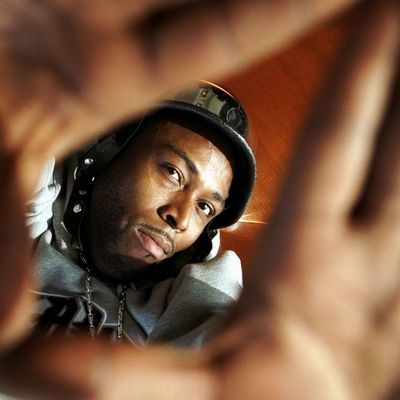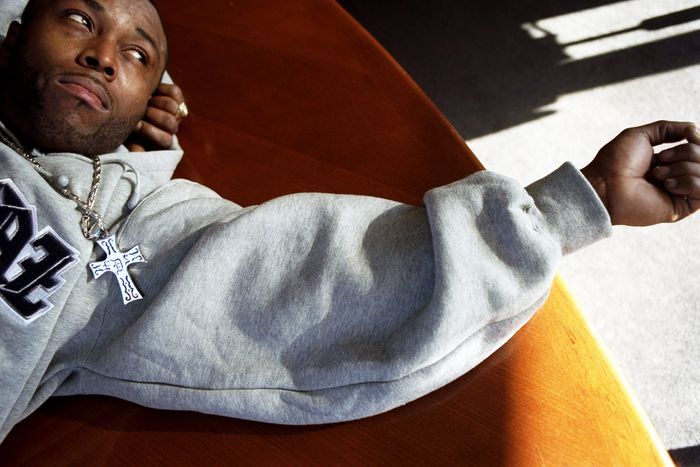
“I work hard for everything I own, and I deserve this / The hardest thing right about now is staying alive, who’d’ve thought Diddy would part ways with Clive?” Black Rob, “Live From the Eastside” (unreleased)
When people think of the dawn of the Bad Boy era in hip-hop in the early to mid-’90s, the focal point is often centered on the Notorious B.I.G. — his meteoric rise and tragic end. Less commonly recognized is the fact that Black Rob, né Robert Ross of Spanish Harlem, was one of the earliest signees to Bad Boy Records — joining the camp, founded by Uptown Records alum and mogul-in-training Sean “Puffy” Combs, soon after Craig Mack’s arrival in 1994 — and helped lay the groundwork for some of the quintessential moments in the label’s legacy for years before his platinum-selling debut album, Life Story, was finally released for public consumption in 2000, resulting in his biggest hit, “Whoa!” A street soldier who might have looked out of place in the Shiny Suit Era of Bad Boy’s glossy music videos but stood strong among some of the era’s greatest artists from Biggie to Mase, Black Rob charted his own critically acclaimed path in a dominant space up until his death at 51 on Saturday, April 17.
Originally under the moniker Bacardi Rob, it was Rob’s ear to the bellicose rhythms that pervaded Harlem’s streets that brought the fellow raucous rapper from the Johnson Houses, G. Dep, into the Bad Boy Entertainment fold in 1998. The two collaborated repeatedly throughout their tenure on the label, most notably on the classic single and video “Let’s Get It.” But even prior to getting G. Dep signed, Rob was essential to establishing the label’s presence. It was mutual friend R.P. who connected Bacardi Rob with Combs, whom he impressed with his skill set; Rob allowed Combs to rename him Black Rob for the stage. He also gained the favor of longtime Bad Boy executive and current president, Harve Pierre, who would ultimately prove critical to Rob’s career trajectory at the label. He’d go on to give a scene-stealing performance on Mase’s 1997 debut, Harlem World, with “24 Hrs. to Live,” alongside DMX; his “I Dare You” collaboration with Pierre, then performing under the stage name Joe Hooker, made the soundtrack to the 1998 film Slam; his rapport with the LOX — Bad Boy’s rap trio of Jadakiss, Styles P, and Sheek Louch — on the 2000 album cut “Can I Live” showcased his ability to hold court with some of the New York area’s biggest heavyweights. Rob was prominently featured on the iconic cover of Puff’s 1997 debut album, No Way Out, with a standout track of his own, “I Love You Baby,” and had features on tracks with Bad Boy’s stable of R&B artists, from 112 to Total. Biggie anointed him on 1998’s “Victory”: “Black Rob joined the mob, it ain’t no replacin’ him.”
Rob’s style was both unyielding and autobiographical; he was in his best form when his husky baritone straddled the line of emotive and narrative. It’s all over the title track to Life Story, which opens with evocative bars detailing his rough-and-tumble life prior to fame: “Never had a dime, my life a crime / Had to be when I was 9, Mom’s drunk off wine / Running with all kinds, her mind stayed in the stupor / Till the point she paid no mind to the super.” A longtime fan of Slick Rick and Doug E. Fresh, his approach melded his street appeal with the narrative stylings of the two legends, coalescing on album cuts like his debut’s “Thug Story,” which also interpolated references to Cru’s “Just Another Case”: “Now this ain’t funny, so don’t you dare laugh, ’cause any one of us could catch the blood bath / Straight and narrow is how n - - - - - should live …”
“Whoa!,” though, was what would make him an inescapable presence throughout uptown New York City. His 2000 chart-topping hit blared through every Cadillac Escalade on Frederick Douglass Boulevard that year, its bombastic streams-of-consciousness undergirded by Diggin’ in the Crates Crew’s Buckwild’s crisp production. Recorded in the midst of frustration with delays to his debut album and creative differences with the label — specifically with Combs, who sought to lean into the crossover appeal of his R&B slate after the Notorious B.I.G.’s passing — the track has become part of the canon of street hits that unofficially announces when summer has arrived for Harlem and the Bronx, on the level of Fatman Scoop’s “Be Faithful.” The standout string sample from François Valéry’s 1983 romantic ballad “Joy” serves as an electric current that engaged fans from the very first note — so much so that an eight-minute “extended Bad Boy Remix” was released.
Tragically, recognition for his efforts within the collective would be an ongoing battle for him. While he was incarcerated for robbery in 2006, Bad Boy reportedly removed him from its website and failed to provide any material support during his stay, financially or emotionally. A featured artist on “Bad Boy for Life,” off Puff’s 2001 album, The Saga Continues …, Rob would learn the hard way that the notorious line from his boss, “Don’t worry if I write rhymes, I write checks,” came with a set of stipulations. Rob tightly focused his music around his life circumstances and around triumph over the chaos he was indoctrinated into. But any such triumph was short-lived — his career, like that of too many rappers, was derailed both by legal issues (later including child-support) and the label’s departure from the gritty, noir-fiction approach to rap performance that had punctuated his music.
While the infamous “Bad Boy Curse” has historically served as a tongue-in-cheek reference to Combs’s inconsistent management style, it is hard to look at Black Rob’s legacy in light of his passing without noticing the pattern of disrepair that afflicted the artists discarded by Bad Boy Records. His labelmate and predecessor Craig Mack passed in 2018 from heart failure in relative isolation from the rest of the industry. G. Dep, the same man Rob first brought to Bad Boy and with whom he had a symbiotic musical relationship, was convicted of murder after a 2010 confession to the police and continuously battled a drug problem that left him worse for wear; he remains incarcerated.
The morning of DMX’s passing, on April 9, Power 105.1 radio personality DJ Self shared a video of Black Rob expressing his well-wishes for the Yonkers legend with whom he had shared similar early life experiences. Rob had recorded the message confined to his own hospital bed, an image that struck a nerve through hip-hop; a GoFundMe was created in response to help with his medical needs and housing support, but it never met its goal. Black Rob’s poor health, however, was not a tightly kept secret: In 2015, he made an appearance on Sway in the Morning, where he spoke about his ongoing health struggles, including high blood pressure and a stroke, the first of four. He had already been dealing with kidney issues, which he revealed to have had difficulty treating during his 2006 incarceration due to Bad Boy Entertainment removing his health insurance. His second album, 2005’s The Black Rob Report, wouldn’t garner the same level of fan acclaim as his debut. Rob said afterward that “it was just a point where they said, ‘Fuck The Black Rob Report’ … Bad Boy left me for dead.”
Last week, his former labelmate Mark Curry expressed that Combs had attempted outreach after learning of Rob’s decline — it was received by many online as too little too late. As a generation of young hip-hop fans contends with a class of legacy acts and legends, there’s a growing, critical question over the proper way for the most-consumed music genre in the U.S. to ensure the care and safety of its own, especially its elders. In concept, it should be unconscionable for anyone affiliated with hip-hop’s rise to be deprived of financial comfort and assistance when some of the marquee names across the contemporary hip-hop recording industry are celebrating near-billion-dollar net worths. Instead, recent years have been weighed down by a pall of grief from the loss of underappreciated icons who formed the genre, left neglected and to fend for themselves while their work remains in circulation. Following Rob’s death, Combs wrote on Instagram, “As I listen to your records today there’s one thing that they all have in common! You have made millions of people all over the world feel good and dance.” Fond emotions don’t maintain entertainers’ families and livelihoods, though — and Rob’s pleas to reconcile with Combs in May 2020 seemed to have gone unanswered.
In his 1999 interview with The Source, Mr. Parker wrote, “If you listen to today’s emcees, anybody within a stone’s throw of a mic or within driving distance of a project building professes his/her thugdom — that elusive element of street credibility that continues to have rappers padding their lyrics with ‘real life’ tales of murder and madness. So if the question is, ‘Will the real bad boy please stand up?’ the answer may very well be Black Rob.” In the time since, some have incorrectly labeled Black Rob as a one-hit wonder. It’s a common mistake, owed to the emphasis of Bad Boy’s Shiny Suit aesthetic belying the presence of Rob’s unrepentant and matter-of-fact lyrics that depicted the life of someone who successfully escaped a life of scarcity-induced crime. The fact remains, however, that Black Rob’s ascendance is pivotal to documenting the rise of Bad Boy, both before and after Biggie.
It’s a bitter pill to swallow that, as a result of oversight, he never felt heralded in kind — his legacy only fully contextualized in the wake of his death. Black Rob deserved better from hip-hop from both its fans and its peers; honoring his name should mean honoring his story to avoid repeating these same sets of circumstances with other artists, depleted of their gifts by the industry. Platinum plaques won’t keep our people alive, and simply comforting ourselves with the memory of hits past resigns us to the complacency of accepting tragedies like Rob’s as an inevitable series of events. Some may argue that the industry and those who run it have no legal obligation to provide for long-disposed-of artists. But consider the nature of exploitative recording contracts, especially those offered at a time when artists had even less legal or business representation (Rob signed to a $450,000 ten-album contract), and consider the continued absence of a proper union for artists. Then much of this recompense can fairly be viewed as overdue, regardless of how trends may now benefit a new class of rappers. It is important to reward emergent work; it is critical to preserve its cultural legacy.





